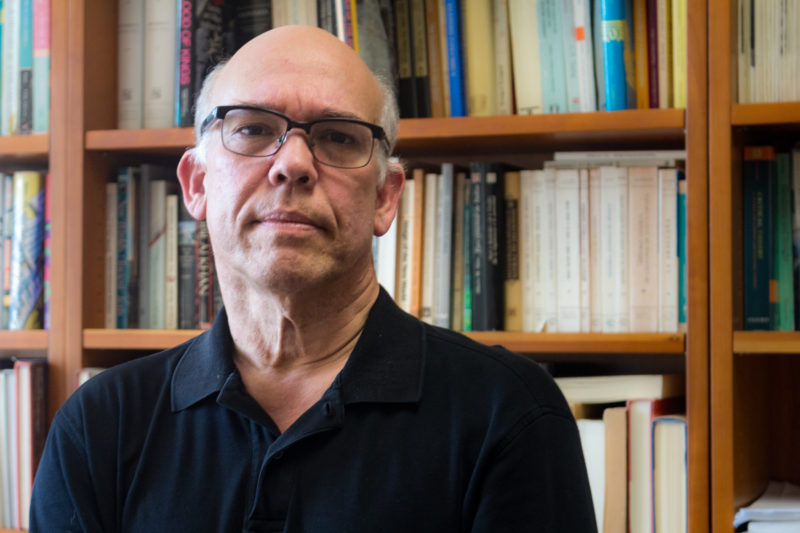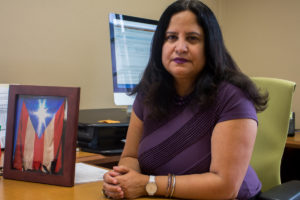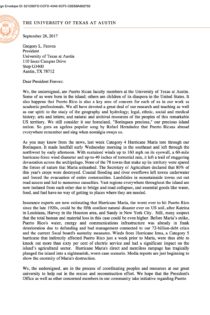Update: UT President Fenves Responds on Calls to Help Academics in Puerto Rico
By Omar Rodriguez-Ortiz
Reporting Texas

Professor César Salgado would like UT Austin to assist Puerto Rican university professors and students whose studies and research have been interrupted by Hurricane Maria. Cesar Lopez Linares/Reporting Texas
Updated Nov. 9,:
President Gregory Fenves has decided that the University of Texas at Austin cannot adopt most of the suggestions from a group of UT faculty members to help university students and faculty in Puerto Rico who have been affected by Hurricane Maria.
“Your suggestions of providing tuition waivers, emergency housing, semester residencies, waiver of fees for research projects, donations of surplus equipment at subsidized rates or access to libraries, were considered, though determined to be ineffectual for the real needs of those suffering in Puerto Rico,” Fenves wrote in a letter dated Oct. 30.
Fenves said UT is open to research collaborations that focus on long-term solutions for the environmental vulnerabilities of the Caribbean.
Fenves offered counseling services for UT students and their families from Puerto Rico who are “struggling to make sense of the ongoing tragedy.”
César Salgado, an associate professor in the Department of Spanish and Portuguese, said he appreciated Fenves’ response.
“I know that he shares our heartbreak and understands the island’s plight,” Salgado said.
The original story:
Puerto Rican professors at the University of Texas at Austin have asked President Gregory Fenves to get UT involved in Hurricane Maria relief efforts by making the university a refuge for students and faculty battered by the storm.
A letter signed by seven faculty members and delivered to Fenves on Friday cited as a model UT’s response to academic disruption in New Orleans in the wake of Hurricane Katrina in 2005. The professors are asking Fenves to “offer lectureships, semester residencies, tuition waivers or emergency housing to students and faculty relocating from institutions of higher learning in the island” and to “waive all overhead fees for research projects funded by the NSF {National Science Foundation} or other such foundations.”
The letter also exhorts Fenves to facilitate access to UT’s online library system while research facilities and services in Puerto Rico are repaired.
“We need academic, personal and humanitarian solidarity because of Puerto Rico’s situation,” said Jossianna Arroyo-Martínez, chair of the Department of Spanish and Portuguese. Other professors include César A. Salgado, Carlos E. Ramos Sharrón, Mónica A. Jiménez and Enrique R. Rodríguez-Alegría, all from several departments in the College of Liberal Arts.
Other signees are Luis H. Zayas, Robert Lee Sutherland Chair in Mental Health and Dean of the School of Social Work, and Francisco González-Lima, George I. Sanchez Centennial Professor in the Department of Psychology and the Dell Medical School.

Professor Jossiana Arroyo Martínez has a Ph.D. in Hispanic Languages and Literatures from Berkeley. She requests UT Austin’s support on research that will aid the people of Puerto Rico and United States Virgin Islands during the process of reconstruction. Cesar Lopez Linares/Reporting Texas
The professors requested that UT offer “special financial and academic accommodations and counseling to UT families and students” similar to what the university did for residents of Houston and other areas of Texas affected by Hurricane Harvey.
J.B. Bird, director of media relations at UT, said Monday administrators had not had time to develop a detailed response. “The first step is that university administrative staff are looking into what is possible and feasible in terms of a response,” Bird said.
On Sept. 20, Maria hit Puerto Rico and its 3.4 million residents with 155 mph winds and torrential rains, leaving the entire island without electricity and about half its residents without water. Puerto Rico Gov. Ricardo Rosselló has said the island faces a “humanitarian crisis.” Damage estimates range up to $95 billion, according to Moody’s Analytics, and the official death toll is 16, although local government officials expect it to rise.
More than five million Puerto Ricans live in the continental United States, according to the Pew Research Center. They are the second-largest Hispanic-origin population living in the country, accounting for about 10 percent of the U.S. Hispanic population. Puerto Ricans, who are American citizens at birth, are also the second-largest population of Hispanic descent in the Austin-Round Rock metro area with 2.4 percent of its 631,000 Hispanic residents, according to a Pew report from 2016.
At UT, 12 undergraduate and graduate students say they’re from Puerto Rico, according to Joe E. Williams, director of communications.
Salgado, an associate professor in the Department of Spanish and Portuguese, has worked at UT for 25 years. “I think the most important thing the university can do is serve as refuge to receive students that can’t continue their studies because their universities are closed due to Hurricane Maria’s destruction,” Salgado said.
“We want to facilitate that students can come here through scholarships, including professors doing research, so they can use UT’s laboratories to continue projects,” Salgado said. In Katrina’s wake, the university accepted a small number of students from Tulane University in New Orleans, Bird said.
Salgado is also concerned about several archives in Puerto Rico that hold unique documents and manuscripts that are essential for his research and that of others in the School of Liberal Arts. Hurricane Irma already damaged important manuscripts in Cuba, and he would like to help Puerto Rico protect its heritage from further damage.
The Universidad de Puerto Rico, the island’s public university, has said classes might start in two to three months if the territory’s reconstruction phase progresses quickly.
“We want to facilitate the reconstruction of the infrastructure of the university on the island as best as we are able to. It’s not an appropriation. We don’t want to empty the country. That is the last thing we want,” Salgado said.
Puerto Rico was already going through the largest exodus of residents in more than 50 years, according to Pew, primarily because of a weak economy, lack of jobs and residents’ access to U.S. passports. Many suspect that thousands of others will leave the island after this most recent devastation.
“I’m sure that President Fenves will mobilize,” Salgado said.
